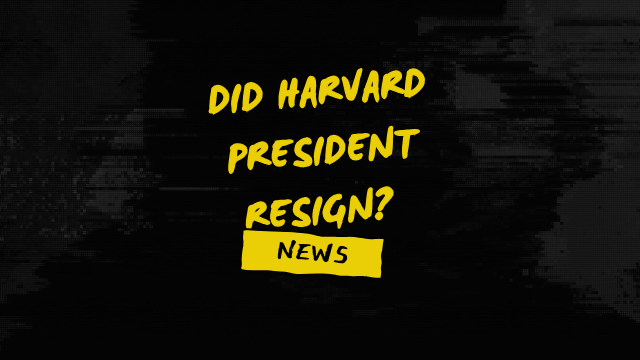In a recent turn of events, Harvard’s president, Claudine Gay, tendered her resignation amidst a growing controversy that has thrust the issue of plagiarism into the limelight. The accusations against her, involving alleged plagiarism in her doctoral dissertation and journal articles, have become a focal point in a broader conservative critique of higher education.
The controversy reached its peak on Tuesday when Claudine Gay officially stepped down from her position. The allegations against her had been mounting for weeks, centering on claims that she borrowed language from other scholars without proper attribution. The timing of these accusations coincided with the backlash over her congressional testimony addressing issues of antisemitism on college campuses.
Plagiarism, considered a cardinal sin in academia, poses a significant threat to the reputation of individuals within the academic community. The American higher education system, known for placing a premium on academic integrity, has historically treated plagiarism as one of the gravest offenses. Instances of plagiarism have, in the past, led to the downfall of both academics and undergraduates.
Harvard, in response to the allegations, conducted thorough reviews of Gay’s academic work, revealing multiple shortcomings in her citations, including instances of “duplicative language.” Despite these findings, the university concluded that the errors were not intentional or reckless and did not amount to misconduct.
However, the allegations persisted, with new accusations emerging as recently as Monday. Notably, the accusers were not fellow academics but rather political adversaries, predominantly conservatives who sought to capitalize on the situation to discredit Gay and subject her career to intense scrutiny. These critics argued that Gay’s ascent to the top position—given her background with a Ph.D. in government, professorships at both Harvard and Stanford, and leadership of Harvard’s largest division—was influenced significantly by her status as a Black woman.
As the controversy unfolds, it underscores the broader tensions between academic institutions and political forces, raising questions about the motives behind the accusations and the potential impact on both the accused individual and the higher education landscape.
Harvard President’s Resignation Amidst Plagiarism Controversy Sparks Conservative Backlash
The recent resignation of Harvard’s president, Claudine Gay, has become a focal point in a broader conservative campaign against elite higher education institutions. Christopher Rufo, a conservative activist orchestrating this effort, celebrated Gay’s departure as a victory in his ongoing campaign against what he perceives as liberal ideologies dominating academic circles.
Rufo, formerly associated with Twitter, expressed his triumph with the word “SCALPED,” portraying Gay as a trophy of violence. This choice of language alluded to the historical violence perpetrated by white colonists against Native Americans. In the aftermath of Gay’s resignation, Rufo announced a renewed focus on countering institutions deemed too liberal by conservatives, particularly targeting diversity, equity, and inclusion (DEI) initiatives in education and business.
Gay, in her resignation announcement, did not directly address the plagiarism accusations but conveyed her concern about doubt being cast on her commitment to upholding scholarly rigor. The allegations surfaced amidst a coordinated campaign to discredit Gay, with a particular emphasis on her involvement in racial justice initiatives on campus. Prominent conservatives, including Rep. Elise Stefanik and billionaire hedge fund manager Bill Ackman, called for her ouster, contributing to the orchestrated efforts.
This controversy unfolded just six months after Gay became Harvard’s first Black president, adding a layer of complexity to the situation. The intense scrutiny faced by university presidents is not unprecedented, with numerous leaders succumbing to plagiarism scandals in the past. Stanford University’s president resigned last year amid allegations of manipulating scientific data, and the president of the University of South Carolina stepped down in 2021 for lifting parts of his graduation ceremony speech.
Walter M. Kimbrough, former president of historically Black Dillard University, drew parallels to his mother’s experience in academia in the 1950s, emphasizing the additional scrutiny faced by people of color. The allegations against Gay originated from conservative activists, some anonymous, scrutinizing her work for duplicated sentences. Although Harvard acknowledged these instances, her defenders argue that the situation isn’t clear-cut, citing the commonality of similar language in specialized fields.
Critics argue that the conservative campaign against Gay is part of a broader effort to reshape higher education, challenging perceived liberal dominance. Republican detractors have sought to diminish funding for public universities, curtail tenure, and restrict discussions on race and gender in classrooms. However, defenders of academic freedom express concerns that such campaigns could potentially weaponize plagiarism investigations for political agendas, creating a chilling effect on university presidents and academic freedom. President Irene Mulvey of the American Association of University Professors fears that these attacks may jeopardize the climate for academic freedom, making university presidents more hesitant to speak out against inappropriate interference for fear of losing their jobs or becoming targets.
Video:
Who is the current Harvard president?
Harvard University’s Leadership Transition: Claudine Gay’s Brief Term and Alan Garber as Interim President
As of the latest available information, the current president of Harvard University is Alan Garber, who assumed the role on an interim basis in 2024. This leadership transition followed the brief tenure of Claudine Gay, who held the position for a period of six months and one day from 2023 to 2024, marking a historic moment as the first Black president in Harvard’s history.
Claudine Gay’s presidency, though notable for breaking barriers, was characterized by its brevity, making it the shortest tenure in Harvard’s rich history. Despite the promising start, her time at the helm came to an unexpected end, prompting the appointment of Alan Garber as the interim president.
Alan Garber, who took on the interim role, assumed the responsibilities promptly after Gay’s departure, marking a swift transition in leadership. While Garber’s tenure as interim president has just begun, the university is in a period of transition and anticipation for the selection of a permanent successor.
The dynamic shift in leadership at Harvard University reflects the institution’s commitment to adapting to evolving challenges and ensuring effective governance. As the university community navigates this transition, the focus remains on maintaining the esteemed reputation of Harvard and continuing its legacy of academic excellence.
Please note that this information is subject to change, and it is advisable to check the latest updates from Harvard University for the most current details regarding its leadership.


